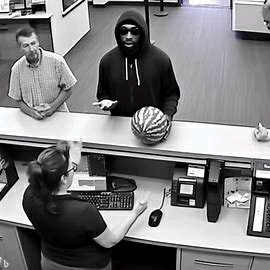
Something really strange happened at the First National Bank in Nairobi, Kenya. A man tried to rob the bank using a watermelon, and it left everyone scratching their heads. The person who did this is making headlines as one of the weirdest bank robbery attempts in recent times.
This person walked into the bank, wearing a black hoodie and sunglasses and went up to the bank teller. Now, instead of using a gun or something you’d expect in a robbery, he put a watermelon on the counter and asked for all the money in the cash drawer. Naturally, the bank teller was very confused. She asked him why he was doing this, and he just repeated his demand. When she didn’t give in, he picked up the watermelon and acted like he was going to use it as a weapon. Scared for her safety, the teller did what he asked and gave him all the money in the drawer. Then, the man ran away from the bank with the money and the watermelon, leaving everyone in shock.
The whole thing was caught on the bank’s cameras, and the video quickly spread on social media. People found it very amusing, and it became a viral sensation.
As the investigation into the watermelon robbery continued, a breakthrough came when an anonymous tipster contacted the police with a possible lead. The tipster claimed to have recognized the distinct hoodie and sunglasses worn by the perpetrator from a local farmers’ market. Acting swiftly, the authorities traced back the watermelon’s origin to a nearby farm, which narrowed down their search significantly.
Upon arriving at the farm, the police were met with confusion and disbelief from the owner, Mr. Johnson. He adamantly denied any involvement in the bank robbery or having knowledge of anyone who might be connected to the incident. However, as the detectives closely inspected the premises, they noticed something peculiar – an inventory shortage of watermelons.
With suspicions rising, the police questioned Mr. Johnson again, pressing for more information. Suddenly, his expression changed from defensive to embarrassed. He confessed that he had recently employed a new farmhand named Tom, whom he suspected might have been responsible for the robbery.
Tom, an eccentric and reclusive individual, had shown a peculiar fascination with watermelons. He often spent hours meticulously tending to them, ensuring their growth and ripeness. Mr. Johnson had initially dismissed it as harmless enthusiasm, but now he realized that something more sinister might be at play.
Armed with this newfound lead, the police immediately launched a manhunt for Tom. They intensively researched his background, questioning his friends and family, and discovered a history of mental health issues. It appeared that Tom had recently stopped taking his medication, which might explain his erratic behavior.
Days turned into weeks, but their search for Tom proved arduous. His elusiveness and presumed knowledge of the local lay of the land made it difficult for the authorities to apprehend him. However, their relentless efforts eventually paid off when a farmer from a neighboring village reported a suspicious man lingering around the watermelon fields.
The police swiftly descended upon the area, and after a brief chase through the fields, they finally captured Tom. He was clad in the same black hoodie and sunglasses depicted in the bank’s surveillance footage. Though initially aggressive, Tom’s demeanor shifted dramatically once he was taken into custody. He exhibited signs of confusion and remorse, as if the gravity of his actions was beginning to sink in.
The trial that followed brought further insight into Tom’s motive. It became evident that he had devised the watermelon heist as a misguided attempt to draw attention to the challenges faced by local farmers. A fervent believer in sustainable agriculture, he believed that the watermelon – a symbol of his trade – would encapsulate the struggle of the farming community and compel the public to take notice.
The courts, sympathetic to Tom’s mental health struggles and recognizing his intention to shed light on a pertinent cause, sentenced him to undergo psychological counseling and community service rather than a lengthy prison term. Furthermore, his case ignited discussions about the importance of mental health awareness and support, prompting the government to allocate resources and funding to better serve those grappling with similar challenges.
Ultimately, the watermelon robbery saga exposed a multitude of complexities and contradictions. While it initially bewildered the nation, it ultimately sparked meaningful conversations and change. Tom’s ill-conceived plan, though ultimately unsuccessful, inadvertently brought attention to critical issues and prompted a renewed focus on mental health support and agricultural sustainability.











